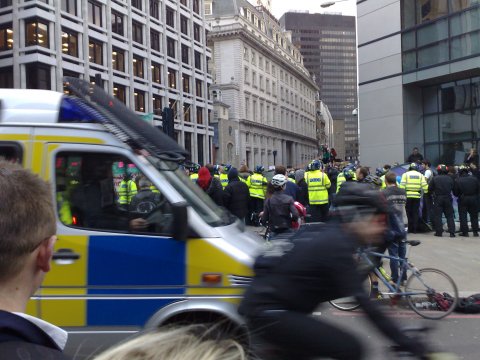CAMPING TO SAVE THE PLANET
Police moving in to contain the G20 protest by Climate Campers in London in August 2009.
BY CASSIE WERBER
Watch the Climate Campers do their bit on the streets of London – campers who might not have any leaders but who do have loads of spunk and imagination.
On a sunny April afternoon in the City of London – the ‘square mile' that forms the capital's financial heart – it is far from business as usual.
The main artery, Bishopsgate, is blocked by a mass of people and tents, barricaded in by bikes and a banner linking climate change to recent financial chaos: ‘Nature doesn't do bail-outs'.
Walking through the crowd camped outside the Climate Exchange – which regulates the controversial scheme of trading carbon emissions permits – the mood is jovial and communal.
Meetings are taking place to decide on the campers' next move; food is being served; people are dancing.
I momentarily leave the protest, walking unhindered through the police cordon; but the man behind me is pushed back into the throng. Turning round, I see the police move in to seal off the entire camp.
The chain of hi-viz bodies is doubled, and then reinforced by vans parked nose-to-tail.
The Metropolitan Police will later have to answer some tough questions about this controversial manoeuvre, known as ‘kettling'; but for now, there is a protest to be contained.
Cheering for the climate
Three months later Climate Camp is meeting again and this time the police have promised to stay away.
They may feel chastened by the huge public outcry that greeted video footage of ‘brutality' at the G20 protest, particularly the fatal assault on bystander Ian Tomlinson.
In an update by its ‘Legal Working Group', Climate Camp is told that within the police ‘attitudes have changed, lessons have been learned'.
In the same briefing the Met's G20 report is highlighted, including the section on difficulties in communication with Climate Camp: “they will not put forward organisers because they say they are a non-hierarchical organisation where nobody makes decisions,” says Commander Bob Broadhurst, responsible for Policing and Security of the G20 protests.
When this is read, a small cheer goes up. However, according to Broadhurst, it “leads to huge problems in trying to find out…what they intend to do and where they intend to do it.”
So what is Climate Camp? A place, an event, a group of people? Over the course of the day I spend with them, it gradually becomes clear that it's a bit of all three. And who's running it? This also becomes apparent: everyone.
There are no leaders. Many of the members, however, like Grainne Gannon, have been active in the movement since its inception around the 2005 G8 summit in Gleneagles, Scotland.
Gannon says that activists and small groups, coming together, “realised there was a potential in all the mass gatherings that were happening. But we wanted to get together on our own terms rather than other peoples'”.
Standing up to police brutality
The first Climate Camp took place later that year near the Drax coal-fired power station in Yorkshire, and the following year focused on Heathrow and its contentious plan for a third runway.
The 2007 protest targeted Kingsnorth power station in Kent, culminating in a day of mass action aimed at “shutting down Kingsnorth by land, air and sea”.
It was in this year that heavy-handed police treatment of protesters reached its pre-G20 zenith, a fact about which Gannon is ambivalent; people got hurt, but also “the police brutality radicalised people.”
This radicalisation is clearly something which Gannon and others in the Camp feel is both necessary and overdue. On the last day at Kingsnorth “about 2,000 people took action together”.
The four main tenets of Climate Camp - movement building, providing examples of sustainable living, education and direct action – have been there from the beginning.
So has the democratic process. The ‘non-hierarchical structure' which foxed police at the G20 is not a cursory or fleeting idea.
At the July meeting I witness a roomful of 80 people attempting – and sometimes achieving – ‘consensus'.
Gannon describes “plenaries with a thousand people in a tent” regularly taking place at camps. This is not just a group trying to make a noise; it's aiming to be the model of a whole new way of doing things.
Anti-capitalism is one of the Camp's core beliefs. Sloganeering at G20 was part of the 2009 plan explicitly to link financial chaos with climate change, because the Campers “don't trust the people who got us into this mess to get us out of it.”
Mass action on coal
When I meet them, Climate Camp is planning its next gathering, a camp overlooking the City, in late August 2009.
The autumn will see “a mass action on coal” with the target chosen through an online vote, and a presence at December's UN conference in Copenhagen.
Gannon – despite having super-glued her hands to the Ministry of Transport and being recently convicted, along with 28 others, of stopping a train carrying coal to Drax -- does not see the Camp's actions as particularly radical, just necessary:
“It's going to be too late by the time politicians finally wake up”. Climate Camp is looking for a viable – and sustainable – alternative.
Cassie Werber has a BA in English Literature from Clare College, Cambridge and an MA in Advanced Theatre Practice from Central School of Speech and Drama in London. She has worked as a theatre director, freelance writer, web editor and journalist and is a member of the Editorial Forum of Total Theatre magazine. Work and personal interest have led her to travel in South East Asia, Australia, the United States and Europe, and now to study in Denmark and the Netherlands. She will complete the Erasmus Mundus course, specialising in Business and Finance, and plans to work in news and current affairs.
